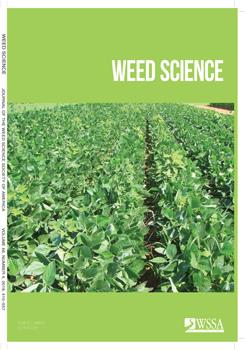Grafting is a common technique used to impart desirable traits to a plant's scion. Herbicide resistant rootstocks have the potential to confer non–genetically modified (non-GM) scions with herbicide tolerance while mitigating some societal concerns regarding GM crops and food. We examined the impacts of soybean cultivar and growth stage and environmental temperature on transference of glyphosate tolerance to conventional (CN) soybean scions when grafted to glyphosate-resistant (RR) rootstocks. Small CN/RR (scion/rootstock) plants (3-leaf stage) and medium-sized plants (6-leaf stage) were injured more than large plants (10-leaf stage) 34 d after treatment (DAT) with 0.84 and 1.68 kg ae ha-1 glyphosate. All CN/CN combinations died, and RR/RR were uninjured. The cultivar of the scion had a greater effect on glyphosate tolerance than the cultivar of the rootstock. CN scions 352 and 5418 were more tolerant than CN scion 5388 across all RR rootstocks 35 DAT when treated with 0.84 kg ha-1 glyphosate. CN/RR construct 5388/9392 was more sensitive to temperature compared with 352/9392. Less leaf regrowth of 5388/9392 was observed under the warmer temperature. Our experiments demonstrated that grafting imparted robust glyphosate tolerance across different plant sizes, environmental temperatures, and scion/rootstock cultivars.
How to translate text using browser tools
1 July 2018
Response of Glyphosate-Resistant and Conventional Soybean Grafted Plants to Glyphosate
Yin Chen,
Linjian Jiang,
Douglas Doohan
ACCESS THE FULL ARTICLE

Weed Science
Vol. 66 • No. 4
July-August 2018
Vol. 66 • No. 4
July-August 2018
Glyphosate tolerance
grafting
soybean cultivar
soybean growth stage
temperature




